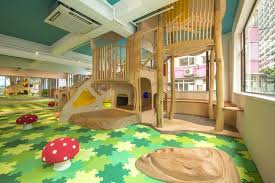
Unleashing the Power of Play: Nurturing Children’s Development Through Playtime
The Importance of Play for Children
Play is a fundamental aspect of childhood that goes far beyond just having fun. It is through play that children learn, grow, and develop essential skills that will benefit them throughout their lives.
When children engage in play, whether it’s imaginative play, physical play, or social play, they are actively exploring the world around them and making sense of their experiences. Play allows children to express themselves creatively, experiment with different roles and scenarios, and build problem-solving skills.
Physical play, such as running, jumping, and climbing, helps children develop their gross motor skills and coordination. It also promotes physical fitness and overall well-being. Imaginative play, on the other hand, encourages creativity, storytelling abilities, and cognitive development.
Through social play, children learn important social skills such as sharing, taking turns, cooperation, and conflict resolution. They also develop empathy and emotional intelligence as they interact with their peers in a playful setting.
It’s crucial for parents and caregivers to recognise the value of play in a child’s development and provide opportunities for unstructured playtime. By allowing children the freedom to explore and create their own games and activities, adults can support their cognitive growth, emotional well-being, and social competence.
In today’s fast-paced world filled with screens and structured activities, it’s more important than ever to prioritise unstructured playtime for children. So let’s encourage our kids to go outside, get messy in the mud kitchen or build a fort out of blankets – because when children play, they are not just having fun; they are learning valuable life skills that will stay with them forever.
Frequently Asked Questions About the Importance and Encouragement of Play in Children’s Development
- What are the benefits of play for children?
- How can parents encourage play in children?
- What types of play are most beneficial for child development?
- At what age should children start engaging in structured play activities?
- What role does imagination play in a child’s playtime?
- How does play contribute to a child’s social development?
What are the benefits of play for children?
Play is not just a source of joy for children; it is also a crucial component of their development. The benefits of play for children are vast and varied. Through play, children enhance their cognitive abilities, improve their motor skills, foster creativity, and develop social and emotional intelligence. Play allows children to explore the world around them, experiment with different roles, and problem-solve in a safe and engaging environment. It promotes resilience, self-confidence, and a sense of curiosity that will serve them well throughout their lives. In essence, play is the foundation upon which children build essential skills that shape their future growth and success.
How can parents encourage play in children?
Encouraging play in children is essential for their overall development and well-being. Parents can foster a playful environment by providing open-ended toys that stimulate creativity, setting aside dedicated playtime each day, and joining in on the fun to show their support and engagement. It’s also important for parents to create a safe and encouraging space where children feel free to explore, experiment, and make mistakes without fear of judgment. By valuing and prioritising play as a crucial part of their child’s growth, parents can help nurture their imagination, social skills, problem-solving abilities, and emotional intelligence through the power of play.
What types of play are most beneficial for child development?
When it comes to child development, various types of play offer unique benefits that contribute to a child’s growth and learning. Imaginative play, such as pretend play and role-playing, helps children develop creativity, problem-solving skills, and emotional intelligence. Physical play, including running, jumping, and climbing, promotes gross motor skills, coordination, and physical fitness. Social play, like cooperative games and group activities, fosters social skills such as communication, teamwork, empathy, and conflict resolution. Each type of play plays a crucial role in enhancing different aspects of a child’s development and overall well-being.
At what age should children start engaging in structured play activities?
The age at which children should start engaging in structured play activities can vary depending on the individual child’s development and readiness. Generally, around the age of 2 to 3 years old, children may begin to show an interest in more structured play experiences. At this stage, they have developed basic motor skills and cognitive abilities that allow them to participate in activities with simple rules or instructions. However, it’s important to remember that play should always be child-led and enjoyable. Introducing structured play too early can limit a child’s creativity and exploration. It’s essential to strike a balance between free play and structured activities to support a child’s holistic development effectively.
What role does imagination play in a child’s playtime?
Imagination plays a crucial role in a child’s playtime, serving as the driving force behind creativity and exploration. When children engage their imaginations during play, they can transform ordinary objects into fantastical worlds, assume different roles and characters, and invent elaborate storylines. Imagination allows children to think outside the box, problem-solve creatively, and develop their cognitive abilities. Through imaginative play, children can express their thoughts and emotions, build confidence in their own ideas, and learn to see the world from different perspectives. Encouraging and nurturing a child’s imagination during playtime not only enhances their enjoyment but also fosters important skills that will benefit them in all areas of life.
How does play contribute to a child’s social development?
Play is a powerful tool that significantly contributes to a child’s social development. Through play, children learn crucial social skills such as cooperation, communication, empathy, and conflict resolution. When engaging in play with their peers, children practice sharing toys, taking turns, and working together towards common goals. They learn to navigate social interactions, express their emotions effectively, and understand the perspectives of others. Play provides a safe and natural environment for children to develop friendships, build trust, and establish connections with others, laying the foundation for healthy social relationships in the future.


